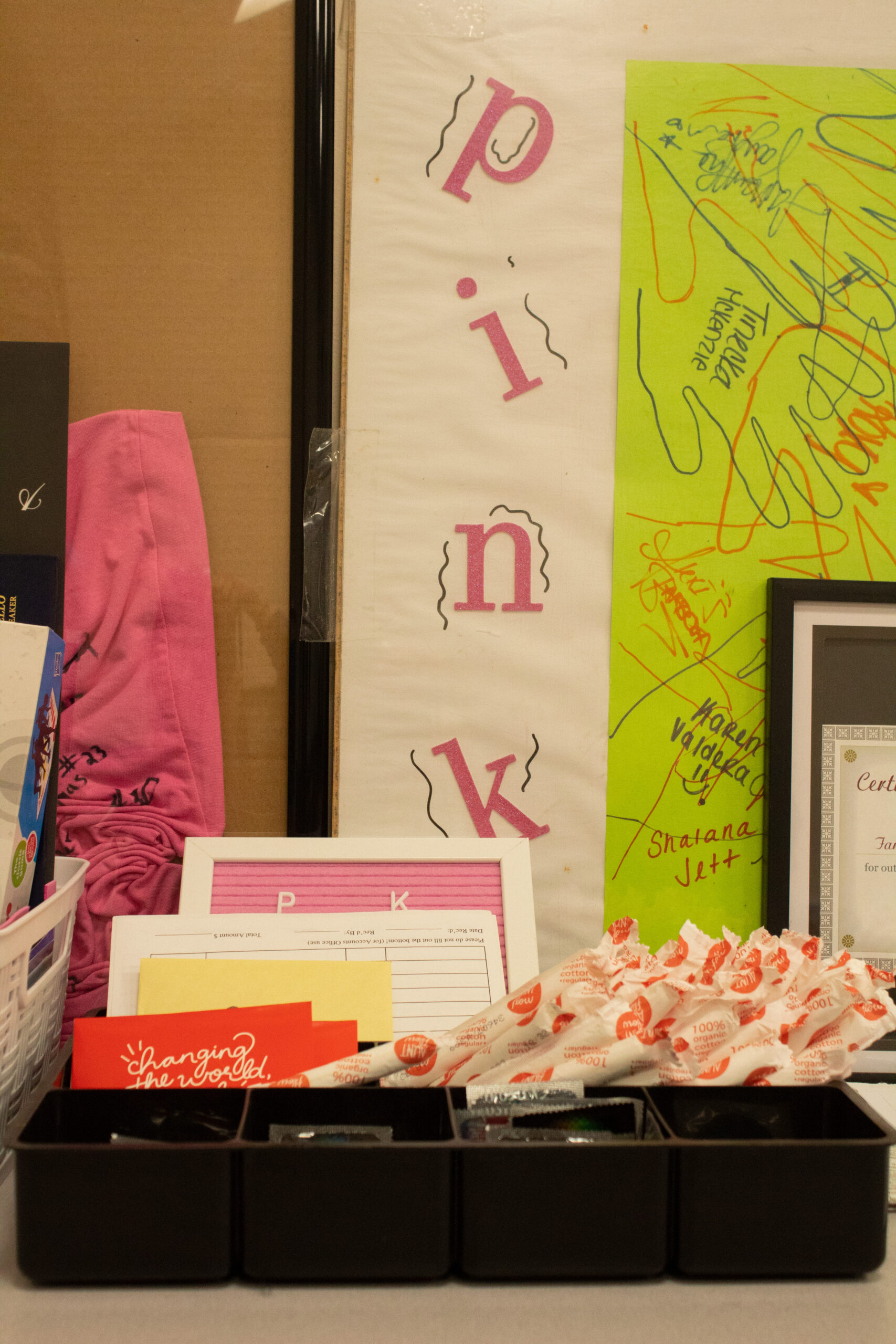Menstrual product drive located in P.I.N.K. office. PHOTO CREDIT: Maddie Bataille | Photo Editor
The University of Rhode Island’s Powerful, Independent, Notoriously, Knowledgeable (P.I.N.K.) Women is hosting a competitive menstrual product drive in order to raise awareness about reproductive rights and encourage community among the University’s multicultural organizations.
After the Dobbs v. Jackson decision that overturned Roe v. Wade, P.I.N.K. Women has prioritized menstrual product equality and reproductive health education, according to fourth-year P.I.N.K. Women Community Service Chair Daezy Thomas.
P.I.N.K. Women is collaborating with the Alumni of Color Network (ACN) and the Multicultural Student Services Center (MSSC) for the menstrual product drive, where all multicultural organizations on campus are encouraged to donate products for those in need.
“Having free period products should be an essential for women,” fifth-year student and P.I.N.K. Women President Lucchina Breneville said. “It’s like an exception. It shouldn’t be something that people have to think about. It should be natural.”
After noticing that URI’s free menstrual product program, “Aunt Flow,” was located only in the University’s Memorial Student Union, Breneville began to think about how having free access to menstrual products should be more than campus-wide.
P.I.N.K. Women’s mission as a student organization is to bring awareness to issues such as domestic violence, breast cancer and reproductive inequality, according to Breneville.
“Even though we do have our own kind of community, ourselves, we also realize that we’re a part of a bigger community,” Brenevillie said. “This is a way of giving back.”
The organization with the most donations in their name will receive P.I.N.K. Women members as support and volunteers at one of their events, according to Thomas. This number of volunteers can range depending on the organization and semester, but the winning organization will receive the help of at least 50 P.I.N.K. Women members.
By having the prize be their services, Thomas hopes that this event will demonstrate P.I.N.K. Women’s strength in volunteering.
In past years, participation from other student organizations at P.I.N.K. Women’s community service events made a “huge difference” in their numbers and event presence, according to Thomas. Thomas hopes that the winning group will experience the benefits of a bigger event turnout, while also being inspired to attend events outside of their respected organization in the future.
While there is intersectionality between the multicultural student organizations on campus, Thomas believes that the competitive period product drive will show the need for it.
P.I.N.K. Women’s core values are community, pride and respect, according to Breneville. Thomas believes that this menstrual product drive is an avenue for community engagement within P.I.N.K. Women.
Thomas is planning to donate the menstrual products to either a local women’s shelter or a lower income school. By providing pads and tampons to people who do not have access to them, P.I.N.K. Women hopes to make a difference both on and off campus.
P.I.N.K. Women is also planning to have a talk about period health with the Boys and Girls Club (BGC) in Newport, according to Thomas.
The BGC is a voluntary organization that offers college preparation, career counseling, fitness strategies and programs that introduce children to health and the arts, according to the organization’s website. Their main priority is providing a space where kids can grow and learn in a supportive and educational environment.
P.I.N.K. Women plans to work with the BGC through talks that discuss the facts and myths of menstrual hygiene, according to Thomas. Along with offering education, Thomas hopes that P.I.N.K. Women can provide kits for the children with pads, tampons, panty liners and ibuprofen.
Because of their work with the BGC, Thomas sees the volunteer organization as an option for receiving the menstrual product drive donations.
In addition to working with groups off campus, Thomas is also considering donating products to URI’s Women’s Center on campus.
Whether the donations go towards one group or multiple groups will depend on the number of period products received.
Even though the menstrual product drive is being held competition-style, URI students not involved with a multicultural organization can donate, according to Thomas. Students can drop off donations in the MSSC or the P.I.N.K. Women office, which is located in the Memorial Student Union.
Students should label donations associated with a specific multicultural organization with a note. Thomas stated that students wanting to donate on the behalf of an organization should do the same, even if they are not directly involved with it.
P.I.N.K. Women’s collaboration with the MSSC and ACN for this menstrual product drive was intentional, according to Robert Britto-Oliveria, assistant director of the MSSC. By fostering community engagement between multicultural student organizations, as well as between past and present students, the MSSC hopes to emphasize the importance of “belonging” at URI.
Through events such as monthly spotlights and panels, the ACN strives to show how community is driven by involvement from all levels, according to Britto-Oliveria. The choice to make P.I.N.K. Women’s menstrual product drive is another step in encouraging such involvement.
The period product drive will continue until around the second week of April, as a way to conclude the organization’s plans during Women’s History Month, according to Thomas.
For updates and information about future events, follow @pinkwomenuri and the @uri_mssc on Instagram.

